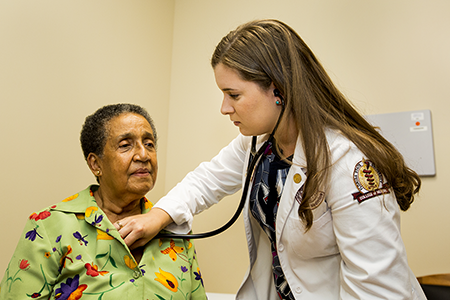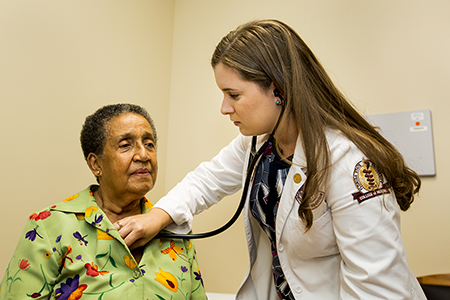Old Florida and a plan for adequate health care


FSU COLLEGE OF MEDICINE STRIVING TO ENHANCE WORKFORCE
TO CARE FOR AGING FLORIDIANS
TALLAHASSEE, Fla. — Florida is home to a larger percentage of older residents than any other state, and the number of those 65 and older is expected to more than double over the next 15 years to nearly 8 million.
To help address the challenges this poses for Florida’s health-care system, the federal Health Resources and Services Administration will give the Florida State University College of Medicine a three-year, $2.25 million grant as part of the national Geriatrics Workforce Enhancement Program.
“The ultimate goal is to enhance the workforce — nurses, social workers, primary-care physicians and the public,” said geriatrician Paul Katz, chair of the College of Medicine’s Department of Geriatrics and past president of the American Medical Directors Association. “We’re not going to be adequately prepared to meet the needs of our older patients in Florida with anything less than a comprehensive approach.”
Florida State was one of 44 organizations in 29 states — including two in Florida — announced as grant recipients at the White House Conference on Aging in July.
“The workforce caring for this population is not only aging itself but also lacks many of the basic geriatric competencies to practice effectively,” Katz said. “This grant will assist us in developing a health-care workforce that maximizes patient and family engagement and improves health outcomes for older adults by integrating primary care and geriatrics.”
The College of Medicine will partner with Florida State’s colleges of Nursing and Social Work, along with regional affiliates involved with the medical school’s community-based medical education program and others. Together they will form the North and Central Florida Geriatrics Workforce Enhancement Partnership.
“These partnerships will address health-care gaps through individual, system, community and population-level changes,” said Ken Brummel-Smith, professor of geriatrics at the College of Medicine and past president of the American Geriatrics Society. “We will be developing six innovative projects that will allow for the creation of new service delivery models in addition to novel opportunities for interprofessional and interdisciplinary training and patient and caregiver education.”
The partnership will seek to address some of the significant health-care issues presented by an aging population:
• One-third of the nursing workforce and 40 percent of the physician workforce nationwide is over age 50. Geriatric-specific curricula for the vast majority of these health-care professionals were either sparse or non-existent during their training.
- Florida ranks 47th nationally in the number of geriatricians per capita.
- Fewer than 1 percent of registered nurses are certified in gerontology, and the vast majority of nursing schools have no faculty with expertise in it.
- In 2009, there were 2.8 million family members serving as caregivers to an older adult in Florida. They provided 2.7 million hours of unpaid care worth an estimated $29 billion. But the ratio of available caregivers to recipients with multiple chronic health problems is rapidly shrinking.
- In rural areas, access to health-care professionals with training in gerontology is even more severely limited.
The partnership extends to 22 counties and closely follows the footprint of the College of Medicine’s community-based medical education program. In Naples, the program will bring the care of older patients into focus at a Federally Qualified Health Center (FQHC), the Health Care Network of Southwest Florida.
“Most FQHCs don’t have a strong orientation toward geriatrics,” Brummel-Smith said. “With the Affordable Care Act, these centers are providing care for more older patients, and they need a model for how to do that well.”
In addition to providing dementia caregiver training to the public, the partnership will bring training in geriatrics to medical residents and to rural health-care providers in coordination with the Alzheimer’s Project of Tallahassee. At primary-care residency programs in Tallahassee, Orlando and Daytona Beach, young physicians in training will be taught the principles of geriatric-focused care as a basis for working with older patients throughout their medical career.
Westminster Communities of Florida will invest resources and provide settings at locations throughout the state for caregiver workshops to be directed by specially trained social workers and community members.
###

